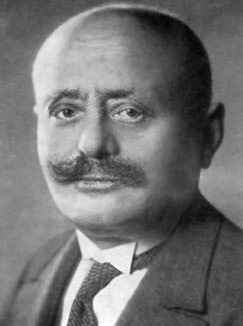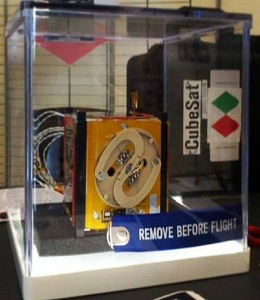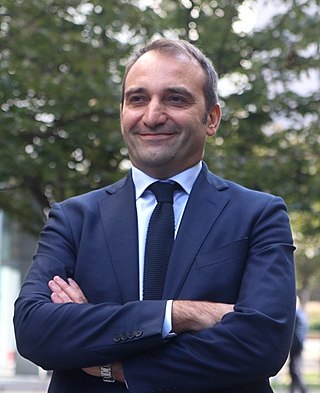
Guido Fubini was an Italian mathematician, known for Fubini's theorem and the Fubini–Study metric.

The Italian Space Agency is a government agency established in 1988 to fund, regulate and coordinate space exploration activities in Italy. The agency cooperates with numerous national and international entities who are active in aerospace research and technology.

The Polytechnic University of Turin is the oldest Italian public technical university. The university offers several courses in the fields of Engineering, Architecture, Urban Planning and Industrial Design, and is consistently ranked as one of the best universities in Italy and in the world. As of 2024, it is ranked 28th worldwide for Mechanical Engineering, 22nd for Petroleum Engineering, 21st for Architecture and is among the top 100 (52nd) engineering and technology universities in the world.

Giovanni Antonio Amedeo Plana was an Italian astronomer and mathematician. He is considered one of the premiere Italian scientists of his age.
11264 Claudiomaccone (provisional designation 1979 UC4) is a stony background asteroid and binary system from the middle regions of the asteroid belt, approximately 3 kilometers in diameter. It was discovered 16 October 1979, by Nikolai Chernykh at Crimean Astrophysical Observatory in Nauchnyj, on the Crimean peninsula. It was named after the Italian astronomer Claudio Maccone.

Thales Alenia Space is a joint venture between the French technology corporation Thales Group (67%) and Italian defense conglomerate Leonardo (33%). The company is headquartered in Cannes, France.
Giancarlo Genta is Professor of Machine Design and Construction at the Polytechnic University of Turin. His areas of professional interest include vibration, vehicle design, magnetic bearings, and rotordynamics. He has written or co-authored more than 50 articles in professional publications. He has published extensively in the field of SETI research.
The Rendiconti del Seminario Matematico Università e Politecnico di Torino is a quarterly peer-reviewed mathematical journal published by the University of Turin and the Polytechnic University of Turin. It is the official journal of the Seminario Matematico dell'Università e Politecnico di Torino. It publishes research papers, invited lectures, and conference proceedings. Noticeable among invited lectures are the Lezioni Lagrangiane, a series of lectures which explore recent scientific progress and future developments in different fields of mathematics and are targeted to a wide public. The journal was established as the Conferenze di Fisica e di Matematica in 1929, obtaining its current name in 1947. The editor in chief is Emilio Musso.

The Nimbus EosXi is an Italian unmanned aerial vehicle (UAV) designed for civilian use, developed and manufactured by NIMBUS Srl.

e-st@r was a miniaturised satellite built by the Politecnico di Torino. It was a 1U CubeSat design with a 10 cm side and a mass not exceeding 1.33 kg.

Daniele Trinchero is an Italian engineer and inventor who founded, in late 2004, with Riccardo Stefanelli, the iXem Labs at Politecnico di Torino, to develop new wireless technologies for applications in Environmental Monitoring and Social Development.

Juan Carlos De Martin is an Italian academic.
Mauro Francaviglia was an Italian mathematician.
FOCAL is a proposed space telescope that would use the Sun as a gravity lens. The gravitational lens effect was first derived by Albert Einstein, and the concept of a mission to the solar gravitational lens was first suggested by professor Von Eshleman, and analyzed further by Italian astronomer Claudio Maccone and others.
The Network of European Regions Using Space Technologies or NEREUS is an international non-profit association. It was created in April 2008 and established under Belgian law. Its registered office is in Brussels, Belgium. The objective of NEREUS is to explore the benefits of space technologies for the European Regions and their citizens, and contribute to spread their applications.
The Aerospace Logistics Technology Engineering Company (ALTEC) is an Italian aerospace company owned by the Italian Space Agency and Thales Alenia Space. It was founded in 2001 by Alenia Spazio and Consorzio Icarus, and is based in Turin. It will serve as the Control Centre for the two ExoMars missions to Mars.

Turin Polytechnic University in Tashkent is a non-profit public higher education institution in Uzbekistan. Turin Polytechnic University in Tashkent was established in 2009 in a partnership with Politecnico di Torino, Italy. TTPU's main objective is to prepare specialists for the automotive, mechanical engineering, electrical industries and companies in the field of civil engineering and construction, and the power industry, in accordance with the educational programs adopted in collaboration with Politecnico di Torino, Italy.

Maria Antonietta Perino is an Italian engineer who is Director International Network Opportunities Development at the Thales Alenia Space. She has previously served as Director for Advanced Exploration Programs, in which capacity she oversaw the ExoMars research programme. In 2019, she was awarded the Stella al Merito del Lavoro by the President of Italy.

Stefano Lo Russo is the Mayor of Torino, Mayor of the Metropolitan City of Turin, Geologist and Professor of Engineering Geology in the Department of Environment, Land, and Infrastructure Engineering at Politecnico di Torino.

Anthea Comellini is an Italian aerospace engineer and reserve astronaut. Comellini completed a PhD on space rendezvous at the Institut Supérieur de l'Aéronautique et de l'Espace, in France, with aerospace company Thales Alenia Space in 2021. She then worked in space navigation operations for the European Space Agency, and the following year, was hired for research and development at Thales Alenia Space. She was chosen as a reserve astronaut in the European Astronaut Corps in 2022.













